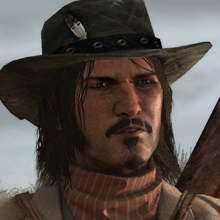The character of Jack Marston in Rockstar’s Red Dead Redemption doesn’t compare favourably to his father, John Marston, but with a bit of mental squinting I came to the conclusion that this character-hobbling was not only deliberate but desirable as well. Spoilers follow for the ending of Red Dead.
 As with most Rockstar games, there’s a disconnect between the narrative derived from the actions of the player and the narrative seen through cutscenes. In Grand Theft Auto IV for instance, the player is told through cutscenes that the protagonist, Niko, is trying to put his violent, criminal past behind and make a new life for himself in America. Meanwhile, in the game itself, you casually murder hundreds of people; you can’t progress in the game unless you do so. The two narratives – the Rockstar narrative and the emergent narrative – are generally contradictory.
As with most Rockstar games, there’s a disconnect between the narrative derived from the actions of the player and the narrative seen through cutscenes. In Grand Theft Auto IV for instance, the player is told through cutscenes that the protagonist, Niko, is trying to put his violent, criminal past behind and make a new life for himself in America. Meanwhile, in the game itself, you casually murder hundreds of people; you can’t progress in the game unless you do so. The two narratives – the Rockstar narrative and the emergent narrative – are generally contradictory.
In Red Dead you can play John Marston as a villain but if you want both narratives to at least try to match up, it doesn’t make much sense to. This is a challenge in itself; I played the game as virtuously as possible but still racked up a body count in the hundreds, razed Mexican villages to the ground and mowed down an army of Native Americans with a machine gun. But still! I also rescued prostitutes from knife attacks and never cheated at poker. As far as the game is concerned, this makes me a goddamned hero.
 If you want to play the game like a bastard, however, the game leaves you with a way to have it both ways. After the game has ended you take control of Jack Marston, and Jack, as far as I can tell, was written deliberately to be a massive prick.
If you want to play the game like a bastard, however, the game leaves you with a way to have it both ways. After the game has ended you take control of Jack Marston, and Jack, as far as I can tell, was written deliberately to be a massive prick.
He’s introduced as a whiny teenager, and through the game’s final few hours we’re forced to sit and listen to him moan on and on and on about how his father left him (for some pretty good reasons that are explained several times to him, but he won’t hear any of it). After his outlaw father dies, Jack spends a few years years moping over his death before going to avenge him by shooting the retired Federal Marshal responsible for his father’s death.
This done, the game world is yours to play with.
 Jack Marston, unlike his father, isn’t trying to put his past behind him; in fact he’s wallowing in it. There’s an achievement in game for slaughtering the last of America’s buffalo, a fairly pointless and cruel thing to do. Earlier in the game we see that Jack can’t hunt, going off in a sulk to prove himself to his father by nearly getting killed by a bear. As I rode him around as an adult, pointlessly shooting the passive, cow-like buffalo just for something to do, he shouted out ‘And Pa said I wasn’t a hunter!’
Jack Marston, unlike his father, isn’t trying to put his past behind him; in fact he’s wallowing in it. There’s an achievement in game for slaughtering the last of America’s buffalo, a fairly pointless and cruel thing to do. Earlier in the game we see that Jack can’t hunt, going off in a sulk to prove himself to his father by nearly getting killed by a bear. As I rode him around as an adult, pointlessly shooting the passive, cow-like buffalo just for something to do, he shouted out ‘And Pa said I wasn’t a hunter!’
Suddenly the act made perfect sense. Feeling ashamed of himself for not being able to hunt, he’s turned to some very easy targets to try and convince himself that he’s a hunter. Of course, his father, expert killer of bears and cougars, would be deeply unimpressed, but he’s dead so he can’t pass judgement.
The longer I roamed the game world as Jack, the more I realised how much his incidental dialogue was skewed toward outbursts about his father. Here are some samples:
Does the name John Marston mean anything to you?
Don’t you know I’m a Marston boy?
Just like you showed me, Pa!
Remember the name “Marston”?
I’m John Marston – Jr.
If Pa could see me now!
My Pa knew Landon Ricketts, friend!
In the three years since his father’s death Jack Marston appears to have done nothing to distinguish himself, instead trading solely on his father’s name and connections. All this plus an unpleasant nasal twang to his voice and a tendency to address his horse as a ‘damned nag’, Jack Marston is pretty unlikeable, but at least the narrative makes sense. It meant that when I lassoed a prostitute, hogtied her and left her on the railway tracks to be run over by a train, I could just blame my actions on the absence of a strong father figure in my character’s life. It wasn’t just for fun.